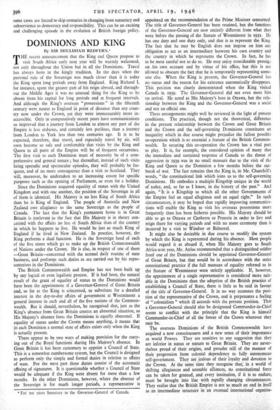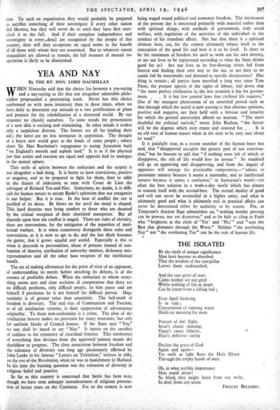DOMINIONS AND KING
By SIR SHULDHAM REDFERN.*
THE recent announcement that the King and Queen propose to visit South Africa early next year will be warmly welcomed, not only throughout the Union but in all the Dominions. Travel has always been in the kingly tradition. In the days when the personal rule of the Sovereign was much closer than it is today the King spent long periods away from England. King Richard I, for instance, spent the greater part of his reign abroad, and through- out the Middle Ages it was no unusual thing for the King to be absent from his capital for long periods and at frequent intervals. And although the King's overseas " possessions " in the fifteenth century were nearer to England in point of distance than any coun- try now under the Crown, yet they were immeasurably more in- accessible. Only in comparatively recent years have communications so improved that a journey from London to almost any part of the Empire is less arduous, and certainly less perilous, than a journey from London to York less than two centuries ago. It is to be expected, therefore, that travel, and especially travel by air, will soon become so safe and comfortable that visits by the King and Queen to all parts of the Empire will be of frequent occurrence. The first visit to each Dominion must of necessity be of a com- prehensive and general nature ; but thereafter, instead of such visits being sporadic and spectacular episodes, they will probably be fre- quent, and of no more consequence than a visit to Scotland. They will, moreover, be undertaken to an increasing extent for specific purposes such as the opening of Parliament, or even for a holiday.
Since the Dominions acquired equality of status with the United Kingdom and with one another, the position of the Sovereign in all of them is identical. His Majesty is no less King of South Africa than he is King of England. The people of Australia and New Zealand owe allegiance to the same Sovereign as the people of Canada. The fact that the King's permanent home is in Great Britain is irrelevant to the fact that His Majesty is in theory con- cerned with the affairs no less of South Africa than of the country in which he happens to live. He would be just as much King of England if he lived in New Zealand. In practice, however, the King performs a dual function. He is the Sovereign head of each of the five states which go to make up the British Commonwealth of Nations under the Crown. He is also, in respect of one of them —Great Britain—concerned with the normal daily routine of state business, and perfornp such duties as are carried out by his repre- sentatives in the Dominions.
The British Commonwealth and Empire has not been built up by any logical or even legalistic process.. If it had been, the natural result of the grant of equality of status to the Dominions would have been the appointment of a Governor-General of Great Britain and, so far as the King is concerned, to substitute for a detailed interest in the day-to-day affairs of government at Westminster a general interest in each and all of the five nations of the Common- wealth. But it should, nevertheless, be recognised that, just as the King's absence from Great Britain creates an abnormal situation, so His Majesty's absence from the Dominions is equally abnormal. If equality of status under the Crovin means anything, it means that in each Dominion a normal state of affairs exists only when the King is actually present.
There appear to be two ways of making provision for the carry- ing out of the Royal functions during His Majesty's absence. In Great Britain it has been customary to appoint a Council of State. This is a somewhat cumbersome system, but the Council is designed to perform only the simple and formal duties in relation to affairs of state. For the most part these duties consist of the automatic affixing of signatures. It is questionable whether a Council of State would be adequate if the King were absent for more than a few months. In the other Dominions, however, where the absence of the Sovereign is for much longer periods, .a representative is * For ten years Secretary to the Governor-General of Canada. appointed on the recommendation of the Prime Minister concerned. The title of Governor-General has been retained, but the functions of the Governor-General are now entirely different from what they were before the passing of the Statute of Westminster in 1931. He has one duty and one duty only, and that is to represent the King. The fact that he may be English does not impose on him any obligation to act as an intermediary between his own country and the country in which he represents the Crown. In fact, he has to be most careful not to do so. He may enjoy considerable prestige on his own account and by virtue of his office, but this is not allowed to obscure the fact that he is temporarily representing some- one else. When the King is present, the Governor-General has no status and the reason for his existence automatically disappears. This position was clearly demonstrated when the King visited Canada in 1939. The Governor-General did not even meet him on arrival. He acted as His Majesty's host in Ottawa, but the rela- tionship between the King and the Governor-General was a social and not an official one.
These arrangements might well be reviewed in the light of present conditions. The practical, though not the theoretical, difference in the present relationship between the Crown and Great Britain and the Crown and the self-governing Dominions constitutes an inequality which in due course might prejudice the fullest possible co-operation which is so essential a feature of the British Common- wealth. In securing this co-operation the Crown has a vital part to play. It is, for example, the considered opinion of many that the immediate and sustained response of Canada to the threat of aggression in 1939 was in no small measure due to the visit of the King and Queen to the Dominion a few months before the out- break of war. The fact remains that the King is, in Mr. Churchill's words, " the constitutional link which joins us to the self-governing Dominions. He embodies a multiple Kingship unique in the world of today, and, so far as I know, in the history of the past." And again, " It is a Kingship to which all the other Governments of the Empire feel an equal allegiance and an equal right." In such circumstances, it may be hoped that rapidly improving communica- tions will enable the King to visit his overseas possessions more frequently than has been hitherto possible. His Majesty should be able to go to Ottawa or Canberra or Pretoria in order to live and reign there for varying periods and with no more ceremony than is incurred by a visit to Windsor or Balmoral.
It might also be desirable in due course to modify the system by which the King is represented during his absence. Most people would regard it as absurd if, when His Majesty goes to South Africa next year, Mr. Attlee recommended that a distinguished soldier froni one of the Dominions should be appointed Governor-General of Great Britain, but that would be in accordance with the strict constitutional practice if the full measure of equality referred to in the Statute of Westminster were strictly applicable. If, however, the appointment of a single representative is considered more suit- able in the Dominions than the adoption of the British practice of establishing a Council of State, there is little to be said in favour of the title of Governor-General. It in no way connotes the posi- tion of the representative of the Crown, and it perpetuates a feeling of " colonialism " which ill accords with the present position. That a Governor-General should also be designated Commander-in-Chief seems to conflict with the principle that the King is himself Commander-in-Chief of all the forces of the Crown wherever they may be.
The overseas Dominions of the British Commonwealth have acquired a new consciousness and a new sense of their importance as world Powers. They are sensitive to any suggestion that they are inferior in status or stature to Great Britain. They are never- theless proud of their origins, and prouder still of the manner of their progression from colonial dependency to fully autonomous self-government. They are jealous of their loyalty and devotion to the Crown. At the same time they recognise that,' in a world of shifting allegiances and unstable alliances, no constitutional force can be taken for granted, and every institution, if it is to endure, must be brought 'into line with rapidly changing circumstances. They realise that the British Empire is not so much an end in itself as an intermediate structure in an eventual international organisa- tion. To such an organisation they would probably be prepared to sacrifice something of their sovereignty if every other nation did likewise, but they will never do so until they have first exer- cised it to the full. And if their complete independence and sovereignty in every .detail are recognised by the people of this country, then will they co-operate on equal terms to the benefit of all those with whom they are associated. But to whatever extent inequalities are allowed to remain, the full measure of mutual co- operation is likely to be diminished.































 Previous page
Previous page